Nearly 60% of people in the US, Canada and Britain believe in at least one notable conspiracy theory. This includes:
- 5% of Americans think airplane vapor trails are poison gas controlled by the government
- 46% of Americans believe in haunting’s or ghosts
- 60% of Americans believe the US Government had something to do with the murder of John F Kennedy
- 55% of Americans believe the US Government is withholding critical information about 9/11 attacks or was directly involved in the attacks
- 15% of Americans believe Astrologers can foretell the future
- 14% of Americans believe Big Foot is real
. - 20% of UK residents think the US moon landing was either completely fake or had some rigged photos
- 13% of Brits believe the world is run by a secret global government
- 10% of Briton’s believe that vaccines are harmful
- 4% of UK citizens believe that AIDS was man made and intentionally spread
. - 42% of Canadians believe that information on the 9/11 attacks has been hidden by the Government
- 14% of Canadians believe vaccines have not been tested enough to be declared as safe
- 3% of Canadians believe the Las Vegas massacre was not perpetrated by a single gunman
… and on and on. There is even a conspiracy theory that Canada does not really exist!
CLICK TO ENLARGE ANY OF THESE IMAGES
We recently explained that the general populations rate of belief in conspiracy theories has not changed over that time and now we now want to know if there is a common thread of those that are more prone to believe such outlandish claims, and it turns out there is.
The research shows that those who are socially “successful” are far less likely to believe in conspiracy theories. Those without authority or resources are much more likely to believe in conspiracy theories.
Watch this interesting video to see Professor Joseph Uscinski discuss his research in conspiracy theory believers:
In simple terms, those in the ‘in-crowd’ generally believe the world is as it seems, while those who are left out think the world is full of fake news. However, beyond economic and social standing, conspiracy theory believers also share distinct personality traits:
“…one major predictor of conspiracy belief was “schizotypy.” That’s a constellation of traits that include a tendency to be relatively untrusting, ideologically eccentric and prone to having unusual perceptual experiences (e.g., sensing stimuli that are not actually present). The trait borrows its name from schizophrenia, but it does not imply a clinical diagnosis.
… we found that people higher in schizotypy have an elevated need to feel unique, which has previously been linked with conspiracism. Why? Probably because believing in non-mainstream ideas allows people to stand out from their peers, but at the same time take refuge in a community of like-minded believers.
…conspiracy believers were also disproportionately concerned that the world is a dangerous place. For example, they were more likely to agree that “all the signs” are pointing to imminent chaos.
Finally, conspiracists had distinct cognitive tendencies: They were more likely than nonbelievers to judge nonsensical statements as profound – for example, “wholeness quiets infinite phenomena” – a tendency cheekily known as “bullshit receptivity.” SOURCE
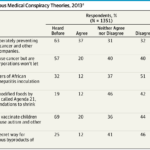
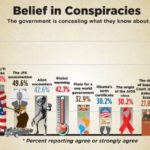
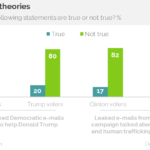
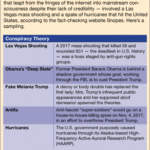
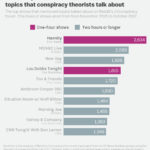

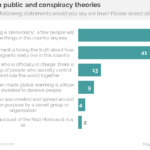

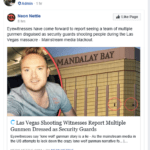
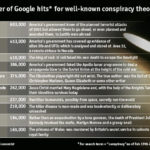



0 Comments